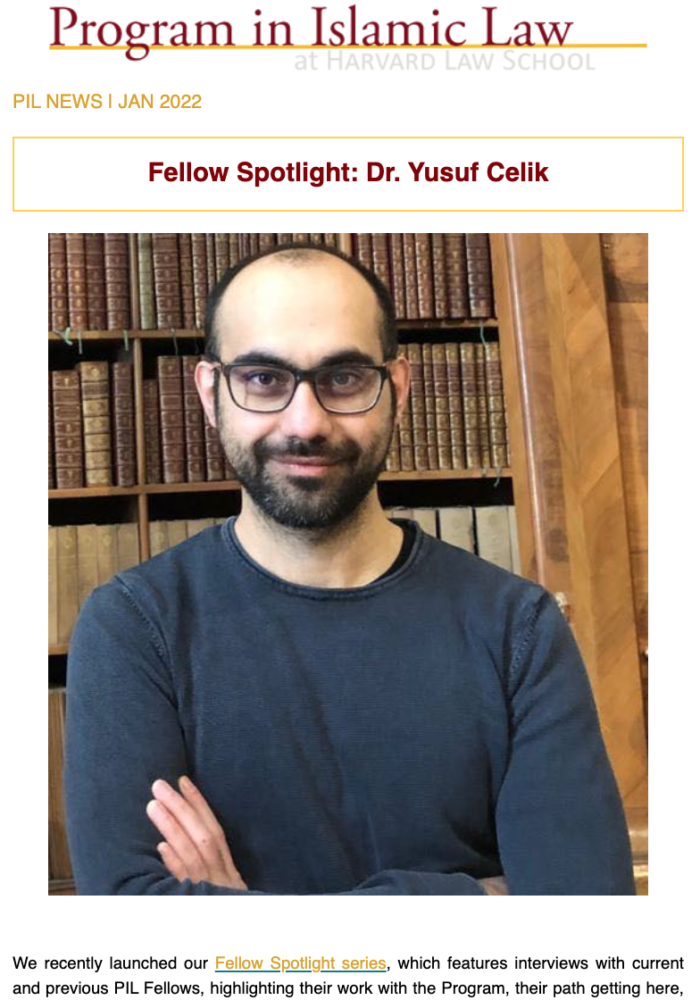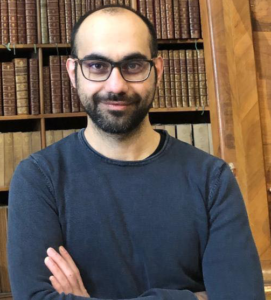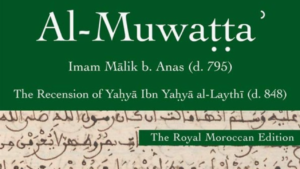
 PIL: Fellow Spotlight: Dr. Yusuf Celik We recently launched our Fellow Spotlight series, which features interviews with current and previous PIL Fellows, highlighting their work with the Program, their path getting here, and the road going forward. This month we featured our current Data Science Fellow, Dr. Yusuf Celik! Dr. Celik is the lead data scientist for the SHARIAsource Courts and Canons Project. His research is on philosophical hermeneutics in Islamic studies, drawing on continental philosophy; and he has also been active for years in the field of software engineering. At Harvard, he is currently exploring ways to synthesize insights from philosophical hermeneutics with new technologies in data science such as deep learning. This year, he is working with Professor Intisar Rabb to build a research platform called Courts & Canons :: Qayyim (CnC-Qayyim), which will enable scholars to ask and answer questions about Islamic law and history, with a focus on legal canons and other genres using advanced search tools, data visualization, and other tools that will enable new insights to both existing and new questions in the field. For more on Dr. Celik’s research, visit his page.
PIL: Fellow Spotlight: Dr. Yusuf Celik We recently launched our Fellow Spotlight series, which features interviews with current and previous PIL Fellows, highlighting their work with the Program, their path getting here, and the road going forward. This month we featured our current Data Science Fellow, Dr. Yusuf Celik! Dr. Celik is the lead data scientist for the SHARIAsource Courts and Canons Project. His research is on philosophical hermeneutics in Islamic studies, drawing on continental philosophy; and he has also been active for years in the field of software engineering. At Harvard, he is currently exploring ways to synthesize insights from philosophical hermeneutics with new technologies in data science such as deep learning. This year, he is working with Professor Intisar Rabb to build a research platform called Courts & Canons :: Qayyim (CnC-Qayyim), which will enable scholars to ask and answer questions about Islamic law and history, with a focus on legal canons and other genres using advanced search tools, data visualization, and other tools that will enable new insights to both existing and new questions in the field. For more on Dr. Celik’s research, visit his page.
You can join our team by applying to our 2022-2023 PIL–LC Research Fellowship, offered in collaboration with the John W. Kluge Center at the The Library of Congress. This new fellowship is designed to provide an intellectual home to promising young scholars in Islamic legal studies, to advance their research, and to contribute to the intellectual life of the Program, the greater Harvard community, and the Library of Congress community. Applications will be accepted until January 31st. Apply today!
 CONTENT: Muwaṭṭaʾ Online Companion One aim of SHARIAsource is to provide access to primary and secondary sources of Islamic law to support research on Islamic law and history. We recently added the consolidated full text of the Original Arabic Royal Moroccan Edition to our Online Companion to the book,Al-Muwaṭṭaʾ, the Royal Moroccan Edition: The Recension of Yaḥyā Ibn Yaḥyā al-Laythī by Mālik b. Anas, edited by Professor Mohammad Fadel and Dr. Connell Monette. This special collection serves as a resource for introducing interested readers to the translation of this core work of Islamic law’s founding period by including an online introduction to the print translation of the Royal Moroccan Edition of the Muwaṭṭaʾ, excerpts of the the English translation itself, and supplemental materials that will provide further biographical and historical background to the people, events, and ideas that inform the legal texts, including maps and timelines, biographies of major figures, and a history of the text. For context on text, check out our Roundtable on the blog.
CONTENT: Muwaṭṭaʾ Online Companion One aim of SHARIAsource is to provide access to primary and secondary sources of Islamic law to support research on Islamic law and history. We recently added the consolidated full text of the Original Arabic Royal Moroccan Edition to our Online Companion to the book,Al-Muwaṭṭaʾ, the Royal Moroccan Edition: The Recension of Yaḥyā Ibn Yaḥyā al-Laythī by Mālik b. Anas, edited by Professor Mohammad Fadel and Dr. Connell Monette. This special collection serves as a resource for introducing interested readers to the translation of this core work of Islamic law’s founding period by including an online introduction to the print translation of the Royal Moroccan Edition of the Muwaṭṭaʾ, excerpts of the the English translation itself, and supplemental materials that will provide further biographical and historical background to the people, events, and ideas that inform the legal texts, including maps and timelines, biographies of major figures, and a history of the text. For context on text, check out our Roundtable on the blog.  CONTEXT: Top Five Blog Posts of 2021 As we say goodbye to 2021, we reflect back on the Islamic Law Blog‘s most popular posts! All of last year’s top posts were part of our Roundtable on Islamic Legal History & Historiography, which kicked-off with an introduction on “Methods and Meaning in Islamic Law” by PIL Faculty Director, Professor Intisar Rabb. The most visited post of the year is an interview with Professor Wael Hallaq “Scholarship as Resistance,” conducted by PhD student, Omar Abdel-Ghaffar. Next up is Professor Sohaira Siddiqui’s “Rethinking Dichotomies: Beyond Continuity and Rupture in Islamic Law in the Colonial Period,” followed by Professor Ahmed El Shamsy’s, “How not to reform the study of Islamic law: A response to Ayesha Chaudhry.” Then we have Professor Marina Rustow’s “Islamic law and the documentary record before 1500: Unsolved problems and untried solutions.” Last, but certainly not least, is an interview with Professor Michael Cook “Simplicity, Creativity, Lucidity as ‘Method’ in the Study of Islamic History,” conducted by Professor Intisar Rabb, who also concluded the Roundtable with “Islamic Legal Canons as Memes.” We look forward to the many exciting posts and guest editors lined up for 2022!
CONTEXT: Top Five Blog Posts of 2021 As we say goodbye to 2021, we reflect back on the Islamic Law Blog‘s most popular posts! All of last year’s top posts were part of our Roundtable on Islamic Legal History & Historiography, which kicked-off with an introduction on “Methods and Meaning in Islamic Law” by PIL Faculty Director, Professor Intisar Rabb. The most visited post of the year is an interview with Professor Wael Hallaq “Scholarship as Resistance,” conducted by PhD student, Omar Abdel-Ghaffar. Next up is Professor Sohaira Siddiqui’s “Rethinking Dichotomies: Beyond Continuity and Rupture in Islamic Law in the Colonial Period,” followed by Professor Ahmed El Shamsy’s, “How not to reform the study of Islamic law: A response to Ayesha Chaudhry.” Then we have Professor Marina Rustow’s “Islamic law and the documentary record before 1500: Unsolved problems and untried solutions.” Last, but certainly not least, is an interview with Professor Michael Cook “Simplicity, Creativity, Lucidity as ‘Method’ in the Study of Islamic History,” conducted by Professor Intisar Rabb, who also concluded the Roundtable with “Islamic Legal Canons as Memes.” We look forward to the many exciting posts and guest editors lined up for 2022!
See the full newsletter.

